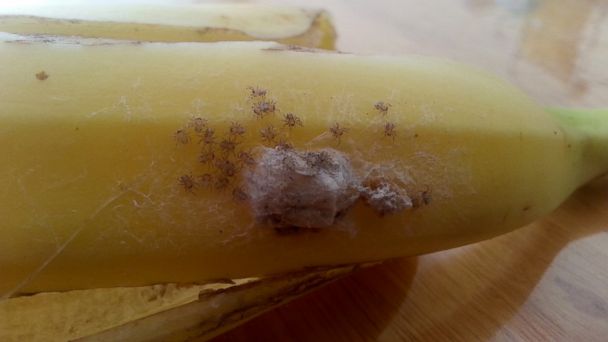Potentially Deadly Spiders Found in Supermarket Banana

Consi Taylor initially thought the swath of spiders was mold. (Image credit: Lee Thompson/The Sun)
A British family was forced to flee its London home after dozens of apparently deadly spiders sprouted from a banana bought from a local supermarket.
Consi Taylor, 29, was halfway through eating a banana when she noticed that the small white patch on the piece of fruit was not mold but something far more alarming.
"I had a closer look and was horrified to see they were spiders," Taylor told The Sun newspaper. "They were hatching out on the table, scurrying around on my carpet."
Taylor took a picture of the spiders and sent it to her local pest control company for guidance. It said the tiny critters could be Brazilian wandering spiders, a species that Guinness World Records designated the world's most venomous spider in 2010
The Taylors evacuated their home and had it fumigated, according to The Sun.
Steven Falk, an entomologist with the invertebrate conservation trust Buglife, said that even if the spiders had been the venomous wandering spider, the babies didn't pose a real threat to humans.
"The truth is often very mundane," Falk told ABC News, adding that "a baby spider doesn't have big enough jaws to bite you."
Stuart Hine, manager of identification and advisory service at the National History Museum in London, went further, telling ABC News that fumigation was "wholly unnecessary," as, even in their natural environment, only one in 500 spiderlings make it to adulthood.
Sainsbury's, the supermarket that sold the bananas, initially gave the Taylor's a £10 ($16) gift card but said this was only an "initial act of good will." It has now given the Taylors "a substantial cash sum," according to a statement.
Having subsequently hired its own spider expert, Sainsbury's said the arachnids were "likely to be a foliage spider or Cheiracanthium ," adding that "all forms of wandering spider are unlikely to survive in this country [the U.K.], either inside or outside, due to their need for warmth and humidity.
"We're very sorry and have apologized to Mr. and Mrs. Taylor," the store wrote. "We do have rigorous controls on imported products at all stages - from harvesting to transportation - which is why this is so rare."